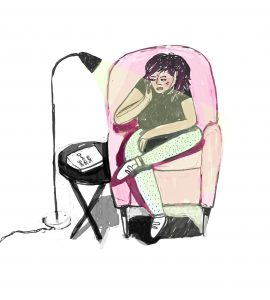
By Jessica Berget, Opinions Editor
For many years I proudly claimed myself to be a feminist. Lately, however, I have been more and more hesitant to associate myself with the community.
It’s not that I don’t appreciate what the movement has done in the past, or that I believe in equality any less than I used to. It’s just that I find feminism has become so contrived by mainstream society that it doesn’t mean what it’s supposed to anymore. It’s also the culture, especially on social media, that gives me reason to distance myself.
In my experience, people tend to treat feminism as an exclusionary club where you must prove yourself to be accepted. Unless you say the same buzzwords and have the exact same set of beliefs, you are not a “true feminist.”
There seem to be many reservations about who can be one and for what reasons. Some say men can’t be feminists, as well as people who err on the right side of the political spectrum. Even some celebrities have been told they can’t be part of this movement because of their lifestyle choices. Yet if anyone wants to identify themselves with feminism for whatever reason, why shouldn’t they?
I think people forget that feminism literally means equality for all genders—not women being the superior gender. Because of this, I find men are often treated unfairly in these communities, solely because they’re men. Personally, I have heard several people suggest that “men can’t be feminists because they don’t experience oppression,” or “they only wear the hat as an excuse to be sexist.” However, people who aren’t women do still experience prejudice based on gender. I’m sure many women also claim to be feminist to cover up their own sexist ideals, but it’s mainly men who receive the brunt of this argument. While this argument may have some merit, who’s to say that all men are like this, or that some women don’t do this as well?
Take for instance the case of the Russian woman who pours water mixed with bleach onto the legs of “manspreaders” on public transit. Also, consider the women who go on Tinder dates just for the free food and never talk to the date again, or the women who say “kill all men” on a regular basis. Many have been quick to say that this is not what feminism stands for, but if this is the kind of negative culture it creates, we need to take a serious look at what we’re doing wrong.
Additionally, I find in the community it seems like women are put on pedestals only because they are women. I believe most celebrities that people deem “feminist icons” use the movement as a tactic to gain popularity or are awful role models that people assume to be idols just because they are women.
I also feel with the mainstreaming of the political movement that some people label themselves as feminists but don’t really know what it stands for. Because it’s become so popularized, it’s more of a label or a trend than a political movement. People can wear “girl power” or “feminist” t-shirts, but that doesn’t mean they believe or advocate for equality.
I’m not saying this is how all feminists are; these are just my experiences with the community. As the title of a bell hooks book says, “Feminism is for everybody,” but because of the flaws I’ve experienced firsthand, I’m not sure if it’s for me anymore.


